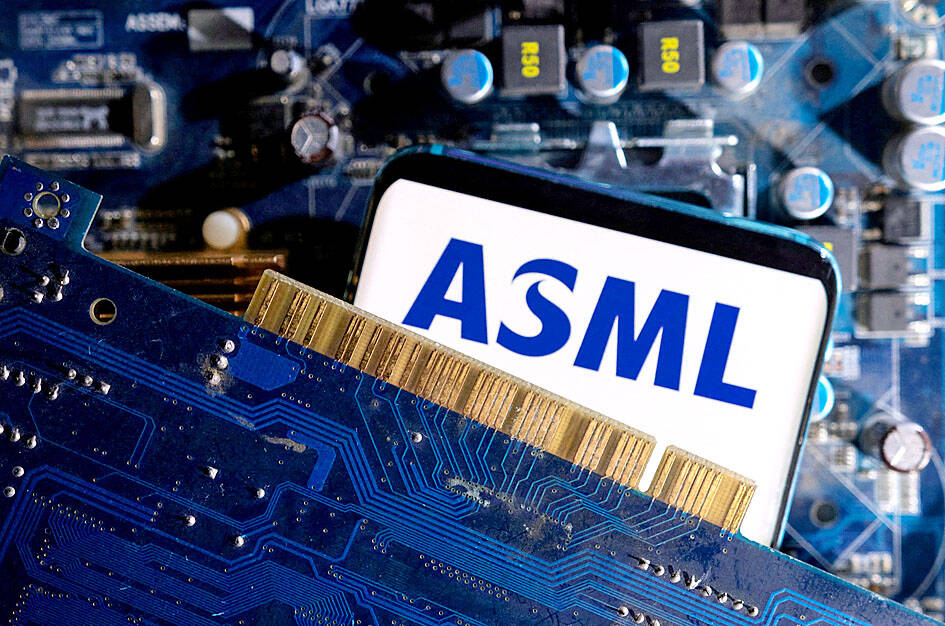The Ministry of Economic Affairs has approved a NT$285 million (US$9.27 million) subsidy to fund ASML Holding NV’s 2-nanometer wafer optical measurement equipment research-and-development (R&D) project in Taiwan, the Central News Agency (CNA) reported yesterday.
The Dutch semiconductor equipment supplier announced in November last year that it would expand its investment in Taiwan by building a new factory in New Taipei City’s Linkou District (林口) to support global customers and the development of the local semiconductor industry.
The world’s sole supplier of extreme ultraviolet lithography (EUV) photolithography machines that semiconductor manufacturers use in the production of cutting-edge chips applied to participate in the ministry’s “A+ Industrial Innovative R&D Program” to obtain funding for the development and manufacturing of 2-nanometer wafer optical measurement equipment in Taiwan.

Photo: Reuters
The ministry said the NT$285 million subsidy would account for 30 percent of the two-year project’s total investment of NT$950 million.
Aside from being the first in the world, the project would enhance the capacity of the local semiconductor supply chain as ASML aims to boost the local chip industry’s self-sufficiency rate to 35 percent, add six Taiwanese suppliers and raise its domestic procurement to NT$7.2 billion per year, the CNA report said, citing unnamed ministry officials.
ASML chose to boost its investment in Taiwan mainly because of the nation’s complete supply chain and proximity to semiconductor customers and suppliers, the officials said.
The company in August 2020 launched a global EUV training center for engineers at the Southern Taiwan Science Park (南部科學園區) in Tainan.

SELL-OFF: Investors expect tariff-driven volatility as the local boarse reopens today, while analysts say government support and solid fundamentals would steady sentiment Local investors are bracing for a sharp market downturn today as the nation’s financial markets resume trading following a two-day closure for national holidays before the weekend, with sentiment rattled by US President Donald Trump’s sweeping tariff announcement. Trump’s unveiling of new “reciprocal tariffs” on Wednesday triggered a sell-off in global markets, with the FTSE Taiwan Index Futures — a benchmark for Taiwanese equities traded in Singapore — tumbling 9.2 percent over the past two sessions. Meanwhile, the American depositary receipts (ADRs) of Taiwan Semiconductor Manufacturing Co (TSMC, 台積電), the most heavily weighted stock on the TAIEX, plunged 13.8 percent in

A wave of stop-loss selling and panic selling hit Taiwan's stock market at its opening today, with the weighted index plunging 2,086 points — a drop of more than 9.7 percent — marking the largest intraday point and percentage loss on record. The index bottomed out at 19,212.02, while futures were locked limit-down, with more than 1,000 stocks hitting their daily drop limit. Three heavyweight stocks — Taiwan Semiconductor Manufacturing Co (TSMC, 台積電), Hon Hai Precision Industry Co (Foxconn, 鴻海精密) and MediaTek (聯發科) — hit their limit-down prices as soon as the market opened, falling to NT$848 (US$25.54), NT$138.5 and NT$1,295 respectively. TSMC's

TARIFFS: The global ‘panic atmosphere remains strong,’ and foreign investors have continued to sell their holdings since the start of the year, the Ministry of Finance said The government yesterday authorized the activation of its NT$500 billion (US$15.15 billion) National Stabilization Fund (NSF) to prop up the local stock market after two days of sharp falls in reaction to US President Donald Trump’s new import tariffs. The Ministry of Finance said in a statement after the market close that the steering committee of the fund had been given the go-ahead to intervene in the market to bolster Taiwanese shares in a time of crisis. The fund has been authorized to use its assets “to carry out market stabilization tasks as appropriate to maintain the stability of Taiwan’s

In a small town in Paraguay, a showdown is brewing between traditional producers of yerba mate, a bitter herbal tea popular across South America, and miners of a shinier treasure: gold. A rush for the precious metal is pitting mate growers and indigenous groups against the expanding operations of small-scale miners who, until recently, were their neighbors, not nemeses. “They [the miners] have destroyed everything... The canals, springs, swamps,” said Vidal Britez, president of the Yerba Mate Producers’ Association of the town of Paso Yobai, about 210km east of capital Asuncion. “You can see the pollution from the dead fish.